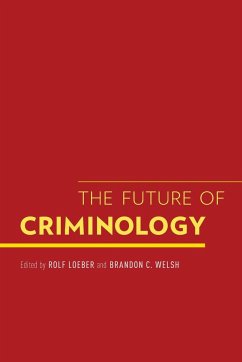Rolf Loeber
Future of Criminology
Rolf Loeber
Future of Criminology
- Broschiertes Buch
- Merkliste
- Auf die Merkliste
- Bewerten Bewerten
- Teilen
- Produkt teilen
- Produkterinnerung
- Produkterinnerung
The Future of Criminology takes stock of the major advances and developments that have taken place in the past several decades and asks where the field of criminology is headed. In thirty-three brief essays, the field's leading scholars provide their views into the future of what needs to be done in research, policy, and practice in the discipline.
Andere Kunden interessierten sich auch für
![The Future of the Criminology of Place The Future of the Criminology of Place]() David WeisburdThe Future of the Criminology of Place73,99 €
David WeisburdThe Future of the Criminology of Place73,99 €![The Future of Policing The Future of Policing]() Scott A. CunninghamThe Future of Policing108,99 €
Scott A. CunninghamThe Future of Policing108,99 €![The Future of Terrorism The Future of Terrorism]() Harvey W. KushnerThe Future of Terrorism190,99 €
Harvey W. KushnerThe Future of Terrorism190,99 €![The Future of Terrorism The Future of Terrorism]() Harvey W. KushnerThe Future of Terrorism137,99 €
Harvey W. KushnerThe Future of Terrorism137,99 €![The Future of Rational Choice for Crime Prevention The Future of Rational Choice for Crime Prevention]() The Future of Rational Choice for Crime Prevention67,99 €
The Future of Rational Choice for Crime Prevention67,99 €![The Future of Policing The Future of Policing]() Scott A. CunninghamThe Future of Policing45,99 €
Scott A. CunninghamThe Future of Policing45,99 €![Handbook of Research on Present and Future Paradigms in Human Trafficking Handbook of Research on Present and Future Paradigms in Human Trafficking]() Handbook of Research on Present and Future Paradigms in Human Trafficking308,99 €
Handbook of Research on Present and Future Paradigms in Human Trafficking308,99 €-
-
-
The Future of Criminology takes stock of the major advances and developments that have taken place in the past several decades and asks where the field of criminology is headed. In thirty-three brief essays, the field's leading scholars provide their views into the future of what needs to be done in research, policy, and practice in the discipline.
Hinweis: Dieser Artikel kann nur an eine deutsche Lieferadresse ausgeliefert werden.
Hinweis: Dieser Artikel kann nur an eine deutsche Lieferadresse ausgeliefert werden.
Produktdetails
- Produktdetails
- Verlag: OUP US
- Seitenzahl: 316
- Erscheinungstermin: 29. Mai 2012
- Englisch
- Abmessung: 234mm x 156mm x 19mm
- Gewicht: 540g
- ISBN-13: 9780199917952
- ISBN-10: 0199917957
- Artikelnr.: 35275442
- Herstellerkennzeichnung
- Libri GmbH
- Europaallee 1
- 36244 Bad Hersfeld
- gpsr@libri.de
- Verlag: OUP US
- Seitenzahl: 316
- Erscheinungstermin: 29. Mai 2012
- Englisch
- Abmessung: 234mm x 156mm x 19mm
- Gewicht: 540g
- ISBN-13: 9780199917952
- ISBN-10: 0199917957
- Artikelnr.: 35275442
- Herstellerkennzeichnung
- Libri GmbH
- Europaallee 1
- 36244 Bad Hersfeld
- gpsr@libri.de
Rolf Loeber is Distinguished University Professor of Psychiatry and Professor of Psychology and Epidemiology at the University of Pittsburgh, Pittsburgh, Pennsylvania, U.S.A., and Professor of Juvenile Delinquency and Social Development, Free University, Amsterdam, Netherlands. He is Co-director of the Life History Program. Brandon C. Welsh is an Associate Professor in the School of Criminology and Criminal Justice at Northeastern University and a Senior Research Fellow at the Netherlands Institute for the Study of Crime and Law Enforcement. He has written nine books, including The Oxford Handbook of Crime Prevention (Oxford University Press, in press).
* Contents
* Foreword: Looking Back and Forward
* David P. Farrington
* A Future of Criminology and a Criminologist for the Ages
* Rolf Loeber and Brandon C. Welsh
* Contributors
* I. DEVELOPMENT AND CAUSATION
* 1. Some Future Trajectories for Life Course Criminology
* D. Wayne Osgood
* 2. Does the Study of the Age-Crime Curve have a Future?
* Rolf Loeber
* 3. Developmental Origins of Aggression: From Social Learning to
Epigenetics
* Richard E. Tremblay
* 4. Biology of Crime: Past, Present, and Future Perspectives
* Adrian Raine and Jill Portnoy
* 5. Self-Control, Then and Now
* Terrie E. Moffitt
* 6. Criminological Theory: Past Achievements and Future Challenges
* Terence P. Thornberry
* 7. Individuals' Situational Criminal Actions: Current Knowledge and
Tomorrow's Prospects
* Per-Olof H. Wikström
* 8. Lack of Empathy and Offending: Implications for Tomorrow's
Research and Practice
* Darrick Jolliffe and Joseph Murray
* 9. Person-in-Context: Insights and Issues in Research on
Neighborhoods and Crime
* Gregory M. Zimmerman and Steven F. Messner
* 10. Risk and Protective Factors in the Assessment of School Bullies
and Victims
* Maria M. Ttofi and Peter K. Smith
* 11. Adult Onset Offending: Perspectives for Future Research
* Georgia Zara
* 12. The Next Generation of Longitudinal Studies
* Magda Stouthamer-Loeber
* II. CRIMINAL CAREERS AND JUSTICE
* 13. Research on Criminal Careers: Part 1: Contributions,
Opportunities, and Needs
* Alfred Blumstein
* 14. Research on Criminal Careers: Part 2: Looking Back to Predict
Ahead
* Alex R. Piquero
* 15. The Harvesting of Administrative Records: New Problems, Great
Potential
* Howard N. Snyder
* 16. Twenty-Five Years of Developmental Criminology: What We Know,
What We Need to Know
* Marc Le Blanc
* 17. Pushing Back the Frontiers of Knowledge on Desistance from Crime
* Lila Kazemian
* 18. Does Psychopathology Appear Fully Only in Adulthood?
* Raymond R. Corrado
* III. PREVENTION
* 19. Preventing Delinquency by Putting Families First
* Brandon C. Welsh
* 20. The Future of Preventive Public Health: Implications of Brain
Violence Research
* Frederick P. Rivara
* 21. "Own the Place, Own the Crime " Prevention: How Evidence about
Place-Based Crime Shifts the Burden of Prevention
* John E. Eck and Rob T. Guerette
* 22. Community Approaches to Preventing Crime and Violence: The
Challenge of Building Prevention Capacity
* Ross Homel and Tara Renae McGee
* 23. Taking Effective Crime Prevention to Scale: From School-Based
Programs to Community-Wide Prevention Systems
* J. David Hawkins, Richard F. Catalano, Karl G. Hill, and Rick
Kosterman
* IV. INTERVENTION AND TREATMENT
* 24. The Human Experiment in Treatment: A Means to the End of Offender
Recidivism
* Doris Layton MacKenzie and Gaylene Styve Armstrong
* 25. Towards a Third Phase of 'What Works' in Offender Rehabilitation
* Friedrich Lösel
* 26. Raising the Bar: Transforming Knowledge to Practice for Children
in Conflict with the Law
* Leena K. Augimeri and Christopher J. Koegl
* 27. Intervening with Violence: Priorities for Reform from a Public
Health Perspective
* Jonathan P. Shepherd
* 28. How to Reduce the Global Homicide Rate to 2 per 100,000 by 2060
* Manuel Eisner and Amy Nivette
* V. PUBLIC POLICY STRATEGIES
* 29. The Problem with Macro-Criminology
* James Q. Wilson
* 30. Staking Out the Next Generation of Studies of the Criminology of
Place: Collecting Prospective Longitudinal Data at Crime Hot Spots
* David Weisburd, Brian Lawton, and Justin Ready
* 31. The Futures of Experimental Criminology
* Lawrence W. Sherman
* 32. Stopping Crime Requires Successful Implementation of What Works
* Irvin Waller
* 33. The Future of Sentencing and Its Control
* Michael Tonry
* Foreword: Looking Back and Forward
* David P. Farrington
* A Future of Criminology and a Criminologist for the Ages
* Rolf Loeber and Brandon C. Welsh
* Contributors
* I. DEVELOPMENT AND CAUSATION
* 1. Some Future Trajectories for Life Course Criminology
* D. Wayne Osgood
* 2. Does the Study of the Age-Crime Curve have a Future?
* Rolf Loeber
* 3. Developmental Origins of Aggression: From Social Learning to
Epigenetics
* Richard E. Tremblay
* 4. Biology of Crime: Past, Present, and Future Perspectives
* Adrian Raine and Jill Portnoy
* 5. Self-Control, Then and Now
* Terrie E. Moffitt
* 6. Criminological Theory: Past Achievements and Future Challenges
* Terence P. Thornberry
* 7. Individuals' Situational Criminal Actions: Current Knowledge and
Tomorrow's Prospects
* Per-Olof H. Wikström
* 8. Lack of Empathy and Offending: Implications for Tomorrow's
Research and Practice
* Darrick Jolliffe and Joseph Murray
* 9. Person-in-Context: Insights and Issues in Research on
Neighborhoods and Crime
* Gregory M. Zimmerman and Steven F. Messner
* 10. Risk and Protective Factors in the Assessment of School Bullies
and Victims
* Maria M. Ttofi and Peter K. Smith
* 11. Adult Onset Offending: Perspectives for Future Research
* Georgia Zara
* 12. The Next Generation of Longitudinal Studies
* Magda Stouthamer-Loeber
* II. CRIMINAL CAREERS AND JUSTICE
* 13. Research on Criminal Careers: Part 1: Contributions,
Opportunities, and Needs
* Alfred Blumstein
* 14. Research on Criminal Careers: Part 2: Looking Back to Predict
Ahead
* Alex R. Piquero
* 15. The Harvesting of Administrative Records: New Problems, Great
Potential
* Howard N. Snyder
* 16. Twenty-Five Years of Developmental Criminology: What We Know,
What We Need to Know
* Marc Le Blanc
* 17. Pushing Back the Frontiers of Knowledge on Desistance from Crime
* Lila Kazemian
* 18. Does Psychopathology Appear Fully Only in Adulthood?
* Raymond R. Corrado
* III. PREVENTION
* 19. Preventing Delinquency by Putting Families First
* Brandon C. Welsh
* 20. The Future of Preventive Public Health: Implications of Brain
Violence Research
* Frederick P. Rivara
* 21. "Own the Place, Own the Crime " Prevention: How Evidence about
Place-Based Crime Shifts the Burden of Prevention
* John E. Eck and Rob T. Guerette
* 22. Community Approaches to Preventing Crime and Violence: The
Challenge of Building Prevention Capacity
* Ross Homel and Tara Renae McGee
* 23. Taking Effective Crime Prevention to Scale: From School-Based
Programs to Community-Wide Prevention Systems
* J. David Hawkins, Richard F. Catalano, Karl G. Hill, and Rick
Kosterman
* IV. INTERVENTION AND TREATMENT
* 24. The Human Experiment in Treatment: A Means to the End of Offender
Recidivism
* Doris Layton MacKenzie and Gaylene Styve Armstrong
* 25. Towards a Third Phase of 'What Works' in Offender Rehabilitation
* Friedrich Lösel
* 26. Raising the Bar: Transforming Knowledge to Practice for Children
in Conflict with the Law
* Leena K. Augimeri and Christopher J. Koegl
* 27. Intervening with Violence: Priorities for Reform from a Public
Health Perspective
* Jonathan P. Shepherd
* 28. How to Reduce the Global Homicide Rate to 2 per 100,000 by 2060
* Manuel Eisner and Amy Nivette
* V. PUBLIC POLICY STRATEGIES
* 29. The Problem with Macro-Criminology
* James Q. Wilson
* 30. Staking Out the Next Generation of Studies of the Criminology of
Place: Collecting Prospective Longitudinal Data at Crime Hot Spots
* David Weisburd, Brian Lawton, and Justin Ready
* 31. The Futures of Experimental Criminology
* Lawrence W. Sherman
* 32. Stopping Crime Requires Successful Implementation of What Works
* Irvin Waller
* 33. The Future of Sentencing and Its Control
* Michael Tonry
* Contents
* Foreword: Looking Back and Forward
* David P. Farrington
* A Future of Criminology and a Criminologist for the Ages
* Rolf Loeber and Brandon C. Welsh
* Contributors
* I. DEVELOPMENT AND CAUSATION
* 1. Some Future Trajectories for Life Course Criminology
* D. Wayne Osgood
* 2. Does the Study of the Age-Crime Curve have a Future?
* Rolf Loeber
* 3. Developmental Origins of Aggression: From Social Learning to
Epigenetics
* Richard E. Tremblay
* 4. Biology of Crime: Past, Present, and Future Perspectives
* Adrian Raine and Jill Portnoy
* 5. Self-Control, Then and Now
* Terrie E. Moffitt
* 6. Criminological Theory: Past Achievements and Future Challenges
* Terence P. Thornberry
* 7. Individuals' Situational Criminal Actions: Current Knowledge and
Tomorrow's Prospects
* Per-Olof H. Wikström
* 8. Lack of Empathy and Offending: Implications for Tomorrow's
Research and Practice
* Darrick Jolliffe and Joseph Murray
* 9. Person-in-Context: Insights and Issues in Research on
Neighborhoods and Crime
* Gregory M. Zimmerman and Steven F. Messner
* 10. Risk and Protective Factors in the Assessment of School Bullies
and Victims
* Maria M. Ttofi and Peter K. Smith
* 11. Adult Onset Offending: Perspectives for Future Research
* Georgia Zara
* 12. The Next Generation of Longitudinal Studies
* Magda Stouthamer-Loeber
* II. CRIMINAL CAREERS AND JUSTICE
* 13. Research on Criminal Careers: Part 1: Contributions,
Opportunities, and Needs
* Alfred Blumstein
* 14. Research on Criminal Careers: Part 2: Looking Back to Predict
Ahead
* Alex R. Piquero
* 15. The Harvesting of Administrative Records: New Problems, Great
Potential
* Howard N. Snyder
* 16. Twenty-Five Years of Developmental Criminology: What We Know,
What We Need to Know
* Marc Le Blanc
* 17. Pushing Back the Frontiers of Knowledge on Desistance from Crime
* Lila Kazemian
* 18. Does Psychopathology Appear Fully Only in Adulthood?
* Raymond R. Corrado
* III. PREVENTION
* 19. Preventing Delinquency by Putting Families First
* Brandon C. Welsh
* 20. The Future of Preventive Public Health: Implications of Brain
Violence Research
* Frederick P. Rivara
* 21. "Own the Place, Own the Crime " Prevention: How Evidence about
Place-Based Crime Shifts the Burden of Prevention
* John E. Eck and Rob T. Guerette
* 22. Community Approaches to Preventing Crime and Violence: The
Challenge of Building Prevention Capacity
* Ross Homel and Tara Renae McGee
* 23. Taking Effective Crime Prevention to Scale: From School-Based
Programs to Community-Wide Prevention Systems
* J. David Hawkins, Richard F. Catalano, Karl G. Hill, and Rick
Kosterman
* IV. INTERVENTION AND TREATMENT
* 24. The Human Experiment in Treatment: A Means to the End of Offender
Recidivism
* Doris Layton MacKenzie and Gaylene Styve Armstrong
* 25. Towards a Third Phase of 'What Works' in Offender Rehabilitation
* Friedrich Lösel
* 26. Raising the Bar: Transforming Knowledge to Practice for Children
in Conflict with the Law
* Leena K. Augimeri and Christopher J. Koegl
* 27. Intervening with Violence: Priorities for Reform from a Public
Health Perspective
* Jonathan P. Shepherd
* 28. How to Reduce the Global Homicide Rate to 2 per 100,000 by 2060
* Manuel Eisner and Amy Nivette
* V. PUBLIC POLICY STRATEGIES
* 29. The Problem with Macro-Criminology
* James Q. Wilson
* 30. Staking Out the Next Generation of Studies of the Criminology of
Place: Collecting Prospective Longitudinal Data at Crime Hot Spots
* David Weisburd, Brian Lawton, and Justin Ready
* 31. The Futures of Experimental Criminology
* Lawrence W. Sherman
* 32. Stopping Crime Requires Successful Implementation of What Works
* Irvin Waller
* 33. The Future of Sentencing and Its Control
* Michael Tonry
* Foreword: Looking Back and Forward
* David P. Farrington
* A Future of Criminology and a Criminologist for the Ages
* Rolf Loeber and Brandon C. Welsh
* Contributors
* I. DEVELOPMENT AND CAUSATION
* 1. Some Future Trajectories for Life Course Criminology
* D. Wayne Osgood
* 2. Does the Study of the Age-Crime Curve have a Future?
* Rolf Loeber
* 3. Developmental Origins of Aggression: From Social Learning to
Epigenetics
* Richard E. Tremblay
* 4. Biology of Crime: Past, Present, and Future Perspectives
* Adrian Raine and Jill Portnoy
* 5. Self-Control, Then and Now
* Terrie E. Moffitt
* 6. Criminological Theory: Past Achievements and Future Challenges
* Terence P. Thornberry
* 7. Individuals' Situational Criminal Actions: Current Knowledge and
Tomorrow's Prospects
* Per-Olof H. Wikström
* 8. Lack of Empathy and Offending: Implications for Tomorrow's
Research and Practice
* Darrick Jolliffe and Joseph Murray
* 9. Person-in-Context: Insights and Issues in Research on
Neighborhoods and Crime
* Gregory M. Zimmerman and Steven F. Messner
* 10. Risk and Protective Factors in the Assessment of School Bullies
and Victims
* Maria M. Ttofi and Peter K. Smith
* 11. Adult Onset Offending: Perspectives for Future Research
* Georgia Zara
* 12. The Next Generation of Longitudinal Studies
* Magda Stouthamer-Loeber
* II. CRIMINAL CAREERS AND JUSTICE
* 13. Research on Criminal Careers: Part 1: Contributions,
Opportunities, and Needs
* Alfred Blumstein
* 14. Research on Criminal Careers: Part 2: Looking Back to Predict
Ahead
* Alex R. Piquero
* 15. The Harvesting of Administrative Records: New Problems, Great
Potential
* Howard N. Snyder
* 16. Twenty-Five Years of Developmental Criminology: What We Know,
What We Need to Know
* Marc Le Blanc
* 17. Pushing Back the Frontiers of Knowledge on Desistance from Crime
* Lila Kazemian
* 18. Does Psychopathology Appear Fully Only in Adulthood?
* Raymond R. Corrado
* III. PREVENTION
* 19. Preventing Delinquency by Putting Families First
* Brandon C. Welsh
* 20. The Future of Preventive Public Health: Implications of Brain
Violence Research
* Frederick P. Rivara
* 21. "Own the Place, Own the Crime " Prevention: How Evidence about
Place-Based Crime Shifts the Burden of Prevention
* John E. Eck and Rob T. Guerette
* 22. Community Approaches to Preventing Crime and Violence: The
Challenge of Building Prevention Capacity
* Ross Homel and Tara Renae McGee
* 23. Taking Effective Crime Prevention to Scale: From School-Based
Programs to Community-Wide Prevention Systems
* J. David Hawkins, Richard F. Catalano, Karl G. Hill, and Rick
Kosterman
* IV. INTERVENTION AND TREATMENT
* 24. The Human Experiment in Treatment: A Means to the End of Offender
Recidivism
* Doris Layton MacKenzie and Gaylene Styve Armstrong
* 25. Towards a Third Phase of 'What Works' in Offender Rehabilitation
* Friedrich Lösel
* 26. Raising the Bar: Transforming Knowledge to Practice for Children
in Conflict with the Law
* Leena K. Augimeri and Christopher J. Koegl
* 27. Intervening with Violence: Priorities for Reform from a Public
Health Perspective
* Jonathan P. Shepherd
* 28. How to Reduce the Global Homicide Rate to 2 per 100,000 by 2060
* Manuel Eisner and Amy Nivette
* V. PUBLIC POLICY STRATEGIES
* 29. The Problem with Macro-Criminology
* James Q. Wilson
* 30. Staking Out the Next Generation of Studies of the Criminology of
Place: Collecting Prospective Longitudinal Data at Crime Hot Spots
* David Weisburd, Brian Lawton, and Justin Ready
* 31. The Futures of Experimental Criminology
* Lawrence W. Sherman
* 32. Stopping Crime Requires Successful Implementation of What Works
* Irvin Waller
* 33. The Future of Sentencing and Its Control
* Michael Tonry








